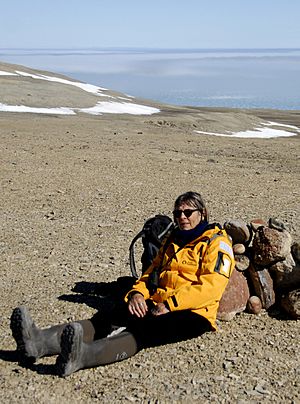Margaret Lock facts for kids
Margaret Lock (born 1936) is a famous British-Canadian scientist called a medical anthropologist. She studies how people's culture and where they live can change how they think about their bodies, health, and medicine. She is known for looking at how new medical tools and ideas affect people all over the world.
Contents
Early Life and Education
Margaret Lock was born in England in 1936. She first trained to be a biochemist at the University of Leeds. A biochemist studies the chemical processes inside living things. In 1961, she moved to Canada.
A Change in Career
At first, Lock worked in science labs in Toronto and at the University of California. She did research at the Banting Institute, which is famous for the discovery of insulin.
However, after a trip to Japan, Lock became fascinated with how different cultures see the world. This led her to make a big career change. She decided to study anthropology, which is the study of people and culture. In 1976, she earned her Ph.D. in cultural anthropology from the University of California, Berkeley.
In 1977, she started working at McGill University in Montreal. There, she helped create one of the world's best programs for medical anthropology. This program studies how health and illness are understood in different societies.
Big Questions About Health and Culture
Lock has written or co-edited 17 books and more than 200 articles. Her work often compares Japan and North America to show that medicine is not the same everywhere. She argues that our ideas about health are shaped by our history and culture.
How Culture Shapes Menopause
One of her most famous books is Encounters with Aging: Mythologies of Menopause in Japan and North America (1993). In this book, she looked at how women experience mid-life and menopause.
She found that women in Japan reported very different experiences from women in North America. This led her to create the idea of "local biologies." This means that our bodies can be affected by our environment and culture. It challenges the idea that human biology is exactly the same for everyone, everywhere.
Redefining Life and Death
Lock also studied how organ transplants changed medicine. Her book Twice Dead: Organ Transplants and the Reinvention of Death (2002) looks at this topic. In the 1960s, doctors had to create a new definition of death, called "brain death," so that organs could be used for transplants.
In Japan, this idea caused a lot of public debate. Many people were not comfortable with the idea that someone could be "dead" even if their heart was still beating. This showed how a medical idea that seemed simple in one culture could be very complicated in another.
The Puzzle of Alzheimer's Disease
More recently, Lock wrote The Alzheimer Conundrum (2013). This book explores the challenges of Alzheimer's disease. She looks at how doctors try to predict the disease using "biomarkers" (signs in the body). However, having these signs doesn't always mean a person will get Alzheimer's. This creates a lot of uncertainty for people.
Her latest work looks at epigenetics. This is a new field of science that studies how our behaviors and environment can cause changes that affect the way our genes work. It explores the old question of nature versus nurture—are we shaped more by our genes or by our experiences?
Awards and Recognition
Margaret Lock has received many awards for her important work.
- Her book about menopause won six prizes, showing how important her idea of "local biologies" was.
- In 1994, she was made a Fellow of the Royal Society of Canada, a high honor for Canadian scholars.
- In 2002, she received the Molson Prize for her contributions to the social sciences.
- In 2004, she was made an Officer of the National Order of Quebec.
- In 2010, she was appointed as an Officer of the Order of Canada, one of Canada's highest civilian honors.
- She has also received the Queen Elizabeth II Diamond Jubilee Medal and many other honors from universities and research groups around the world.
 | Emma Amos |
 | Edward Mitchell Bannister |
 | Larry D. Alexander |
 | Ernie Barnes |


